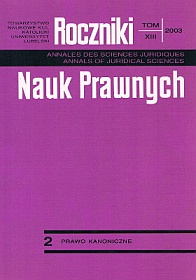Sakramenty inicjacji chrześcijańskiej w świetle Magisterium Kościoła katolickiego do Vaticanum II
Abstrakt
The paper seeks to discuss the problem of the sacraments of Christian initiation. This issue has not been sufficiently studied in theology and canon law. Thus the disposition of the Magisterium of the Catholic Church is called to mind here.
Lateran Council IV of 1215 was the first universal council that not only mentioned the sacraments but also presented some points of doctrine. The Florence Council spoke more extensively about the sacraments. Contrary to the distortions of the Reformation and supplementing, as it were, its teaching about justification, the Tridentine Council confirmed the number of the seven sacraments. It laid a particular stress on the fact that Christ had made them, and their salvational effectiveness originates in Him.
As regards the establishment of the sacraments by Christ, the Apostolic Constitution of Pius XII Sacramentum ordinis of 1947 states that, „The Church has no power over the essence of the sacraments, that is, on those components of the sacramental sign which - following the testimony of the sources of Divine Revelation - must be preserved as being establishment by Christ the Lord Himself.” The constitution refers to Tradition manifested clearly by the Tridentine Council. The hierarch of the Church is entitled to define everything that is indispensable for the valid and fruitful administration of the sacraments.
One should state that the Magisterium of the Church fulfills a special service on behalf of the whole of community. The Magisterial Office referred and still refers to the salvational truth proclaimed by Christ, in order to explain it and adjust it to the changes undergoing at any time and in any situation.
Many of these valuable dispositions of the Magisterium of the Catholic Church permit us today to better understand the numerous dilemmas as regards the three sacraments of Christian initiation.
Copyright (c) 2003 Roczniki Nauk Prawnych

Utwór dostępny jest na licencji Creative Commons Uznanie autorstwa – Użycie niekomercyjne – Bez utworów zależnych 4.0 Międzynarodowe.


